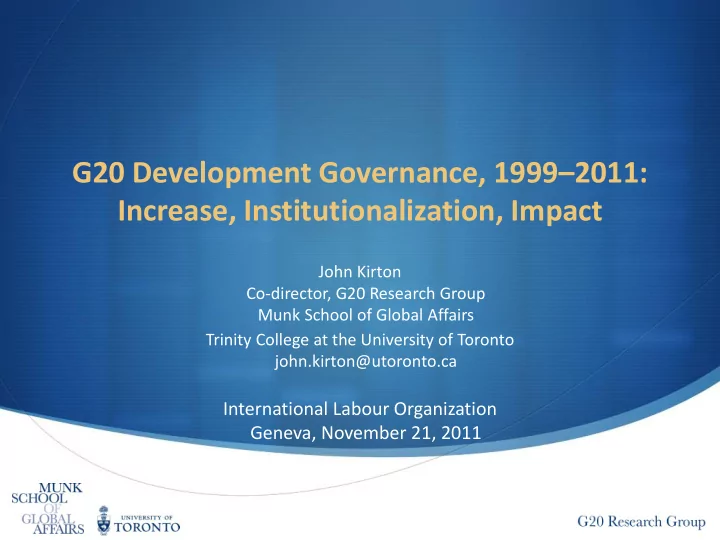

G20 Development Governance, 1999 – 2011: Increase, Institutionalization, Impact John Kirton Co-director, G20 Research Group Munk School of Global Affairs Trinity College at the University of Toronto john.kirton@utoronto.ca International Labour Organization Geneva, November 21, 2011
Introduction • Conceived as economic and financial forum • Increased involvement in international development • Trend towards increased involvement, integration and institutionalization
The G20 ’ s Creation, 1999 • Creation as gathering of finance ministers and central bank governors • Rotating presidencies since 1999
The G20 ’ s Development Mission, 1999 – 2011 • Mission of G20 from the start as promoting sustainable world economic growth that benefits all • Goals of reducing poverty, helping heavily indebted poor countries (HIPCs), improving effectiveness of official development assistance (ODA) • Support for Doha Development Agenda
The Expanding Development Agenda, 1999 – 2008 • Incorporation of development in more areas of the G20 agenda: Berlin 1999 Montreal 2000 Berlin 2004 Ottawa 2001 China 2005 India 2002 Australia 2006 Mexico 2003 South Africa 2007 Brazil 2008
Decisional Commitments on Development: China as Champion
The G20 Summit ’ s Rising Development Performance, 2008 – 2011 Increasing Attention Compliance
Washington, November 2008: Open Markets for Poverty Reduction • Focus on financial issues • Importance of good governance, accountability, transparency • Poverty reduction through open markets, investment, entrepreneurship
London, April 2009: Stimulus and IFI Reform for Development • Agenda expanded to credit, climate adaptation, reform of international financial institutions • Traditional priorities reorganized to advance development • Stimulus package targeted at development and protection from financial crisis
Pittsburgh, September 2009 • Momentum on IFI reform and resources for multilateral development banks (MDBs) • Framework for Strong, Sustainable and Development Growth • G20 Finance Challenge for small and medium-sized enterprises • G20 Financial Inclusion Experts Group
Toronto, June 2010: Conception of the Seoul Development Consensus • Focus on economy and finance in early days of the erupting Greek crisis • Introduction of new development focus to be developed at Seoul • Development Working Group
Seoul, November 2010: Creation of the Seoul Development Consensus • Shift from short-term crisis response to long-term sustainable growth • Seoul Development Consensus and Action Plan based on nine pillars: Resilient growth Trade Financial inclusion Food security Infrastructure Domestic resource mobilization Private investment and job Human resource development creation Knowledge sharing
The Shortcomings of the Seoul Development Consensus • Focus on physical capital • Lack of new financial resources • Inadequate response to call for accountability • No new mechanisms • No expansion of representation to include low-income countries or civil society • No links between long-term sustainability, food security, climate change and development
The Impact of the Seoul Summit • Increased deliberation and decision making • High compliance on ODA delivery • Effort to improve policy coherence and cooperation • Lee Myung-bak ’ s determination • IMF voice and vote reform, financial safety nets, financial regulation for developing countries
Cannes, November 2011 • Food security • Financial transaction tax (FTT) to fund development and climate adaptation • Infrastructure • Trade and the Doha Development Agenda • G20 agriculture ministers
Conclusion • Increasing attention to standard development issues • Cumulative but not continuous contribution • From Cannes in 2011 to Los Cabos in 2012
Recommend
More recommend